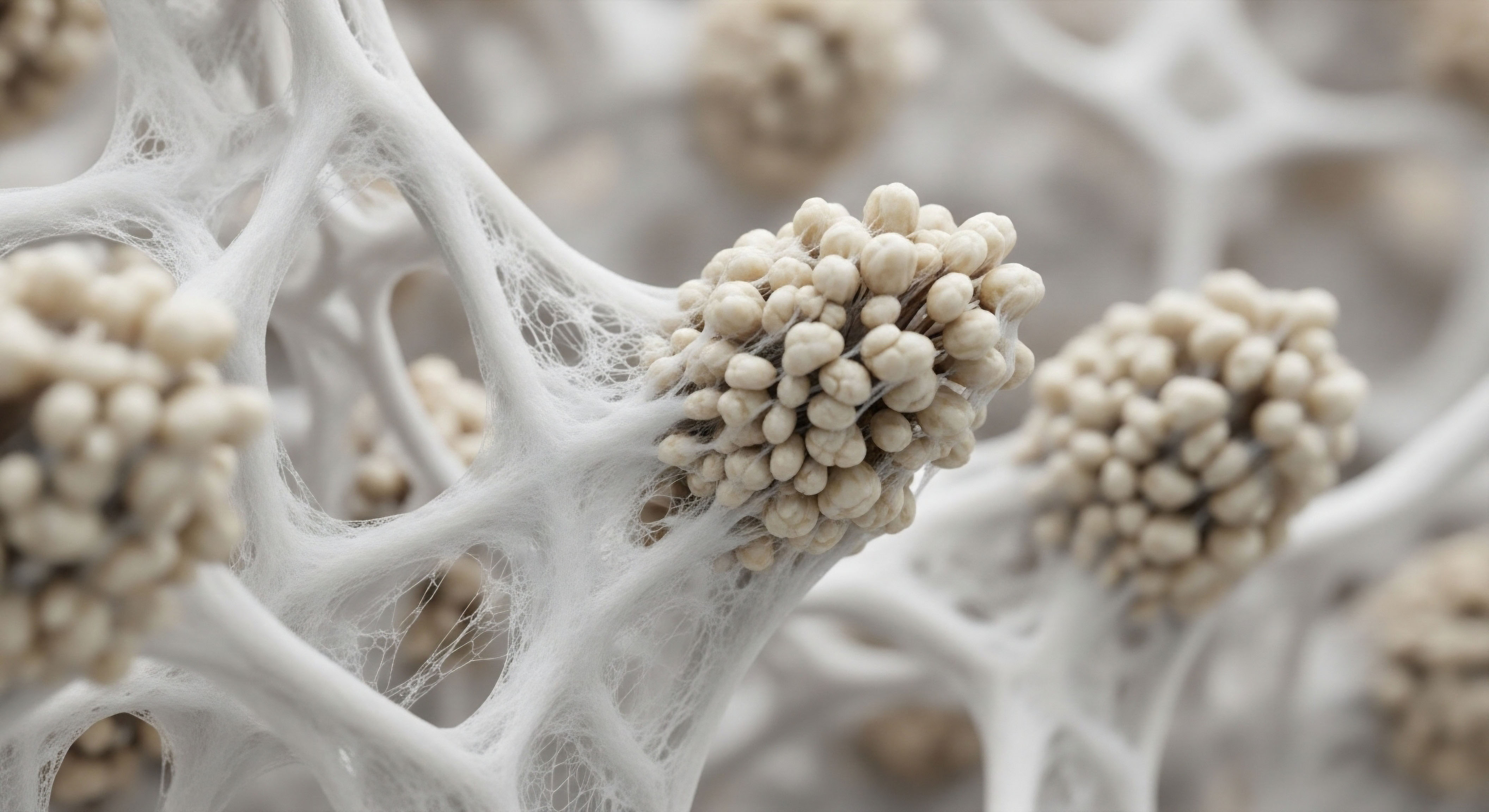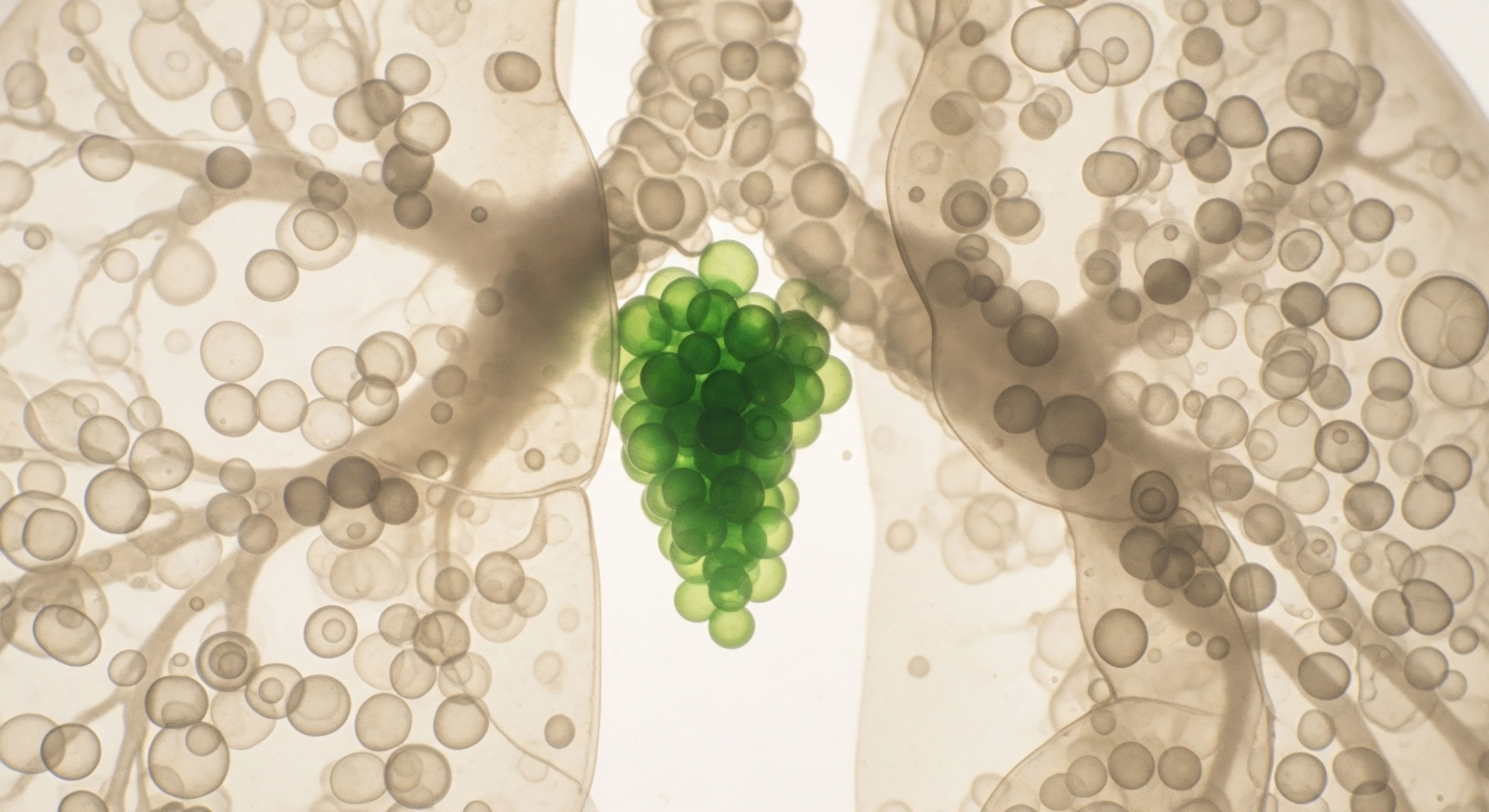

Fundamentals
Many individuals experience a subtle, yet persistent, sense of unease within their own bodies. Perhaps it manifests as a persistent fatigue that no amount of rest seems to resolve, or a creeping anxiety that feels disconnected from external stressors.
Some might notice shifts in their body composition, despite consistent efforts, or a diminished drive that leaves them feeling less vibrant than they once were. These sensations, often dismissed as simply “getting older” or “stress,” frequently point to a deeper conversation occurring within our biological systems, particularly the intricate dialogue between our gut and our hormones. Understanding this connection is a vital step toward reclaiming a sense of well-being and function.
The gut, often considered merely a digestive organ, is a complex ecosystem teeming with trillions of microorganisms, collectively known as the gut microbiome. This internal community plays a far more expansive role than simply processing food; it acts as a central command center influencing numerous physiological processes, including those that govern our endocrine system. When this delicate balance is disrupted, a cascade of effects can ripple throughout the body, directly impacting hormonal equilibrium.

The Gut as an Endocrine Modulator
Our gut microbiome participates actively in the metabolism and regulation of various hormones. For instance, certain bacteria possess enzymes that can deconjugate hormones, particularly estrogens, which allows them to be reabsorbed into circulation rather than excreted. This process, often termed the estrobolome, significantly influences the body’s overall estrogen load. An imbalanced estrobolome, characterized by an overgrowth of specific bacterial strains, can lead to excessive estrogen recirculation, potentially contributing to conditions associated with estrogen dominance.
The gut microbiome is a complex ecosystem that significantly influences the body’s hormonal balance, extending far beyond simple digestion.
Beyond estrogens, the gut also plays a role in the synthesis and regulation of neurotransmitters, such as serotonin, which are intimately linked to mood and indirectly affect hormonal signaling pathways.
A healthy gut lining, maintained by a diverse microbial community, is essential for preventing the leakage of undigested food particles and toxins into the bloodstream, a phenomenon known as intestinal permeability or “leaky gut.” This permeability can trigger systemic inflammation, which is a known disruptor of endocrine function, interfering with receptor sensitivity and hormone production.

Recognizing the Signals of Imbalance
The signals indicating a potential gut-hormone imbalance are diverse and often overlap with other health concerns. Individuals might experience digestive discomfort, such as bloating or irregular bowel movements, alongside symptoms commonly associated with hormonal fluctuations. These can include persistent fatigue, changes in sleep patterns, mood shifts, skin issues, or even difficulties with weight management. Recognizing these interconnected signals is the initial step in a personalized approach to wellness.
For those undergoing hormonal optimization protocols, such as testosterone replacement therapy (TRT) for men or women, or other endocrine system support, understanding the gut’s influence becomes even more pertinent. The efficacy of these biochemical recalibrations can be significantly modulated by the underlying health of the digestive system. A well-functioning gut ensures optimal absorption of therapeutic agents and supports the body’s ability to process and utilize these compounds effectively, thereby maximizing the benefits of the chosen protocol.


Intermediate
Understanding the foundational connection between gut health and hormonal equilibrium sets the stage for exploring specific clinical protocols. When individuals seek to recalibrate their endocrine system through targeted therapies, the state of their digestive environment becomes a critical consideration. These therapies, whether involving testosterone, progesterone, or growth hormone peptides, operate within a complex biological network where gut function can either facilitate or impede their desired outcomes.

Hormonal Optimization Protocols and Gut Interplay
Testosterone replacement therapy, a common intervention for men experiencing symptoms of low testosterone, typically involves weekly intramuscular injections of Testosterone Cypionate. This protocol often includes adjunctive medications like Gonadorelin, administered subcutaneously twice weekly to help maintain natural testosterone production and fertility, and Anastrozole, an oral tablet taken twice weekly to manage estrogen conversion. For women, testosterone optimization protocols might involve subcutaneous injections of Testosterone Cypionate or long-acting testosterone pellets, with progesterone prescribed based on menopausal status.
The gut’s role here is multifaceted. Optimal absorption of oral medications, such as Anastrozole, relies on a healthy intestinal lining. Beyond absorption, the liver processes hormones and their metabolites, and the gut microbiome influences the recirculation of these compounds. An impaired gut can lead to increased systemic inflammation, which directly interferes with the sensitivity of hormone receptors throughout the body.
This means that even with appropriate dosing of exogenous hormones, the body’s cells may not respond as effectively if chronic inflammation from gut dysbiosis is present.
Gut health directly impacts the effectiveness of hormonal therapies by influencing absorption, metabolism, and cellular receptor sensitivity.
Consider the analogy of a sophisticated internal messaging service. Hormones are the messages, and receptors are the receiving stations. If the receiving stations are clogged or damaged by inflammatory signals originating from an unhealthy gut, the messages, no matter how perfectly delivered, may not be received or acted upon efficiently.

Targeted Peptide Therapies and Gut Function
Peptide therapies, such as those involving Sermorelin, Ipamorelin / CJC-1295, or Tesamorelin for growth hormone support, and PT-141 for sexual health, also interact with the body’s internal environment. While many peptides are administered via injection, their systemic effects are still influenced by overall metabolic health, which is intrinsically linked to gut function. A healthy gut supports nutrient assimilation, which is vital for the synthesis and action of various peptides and their downstream effects on muscle gain, fat loss, and tissue repair.
For instance, Pentadeca Arginate (PDA), used for tissue repair and inflammation modulation, relies on a well-regulated inflammatory response within the body. Chronic, low-grade inflammation stemming from gut dysbiosis can counteract the anti-inflammatory effects of such peptides, diminishing their therapeutic potential.

Comparing Hormonal and Peptide Therapy Considerations
The table below outlines how gut health considerations intersect with different therapeutic approaches:
| Therapy Type | Primary Mechanism | Gut Health Influence |
|---|---|---|
| Testosterone Replacement Therapy | Exogenous hormone supply, estrogen management | Absorption of oral agents, liver detoxification, estrobolome activity, systemic inflammation |
| Growth Hormone Peptides | Stimulation of endogenous growth hormone release | Nutrient absorption for peptide synthesis, metabolic health, inflammatory status |
| Post-TRT/Fertility Protocols | Modulation of HPG axis (e.g. Gonadorelin, Tamoxifen, Clomid) | Liver metabolism of medications, overall systemic balance for endocrine feedback loops |
Optimizing gut health through dietary adjustments, targeted supplementation, and lifestyle modifications can therefore act as a powerful adjunctive strategy, enhancing the effectiveness and safety of these advanced biochemical recalibrations. It is not merely about introducing external compounds; it is about preparing the internal environment to receive and utilize them optimally.


Academic
The sophisticated interplay between the gut microbiome and the endocrine system represents a frontier in personalized wellness. Beyond superficial connections, a deep exploration reveals intricate molecular and cellular mechanisms through which gut health directly modulates hormonal balance, particularly during therapeutic interventions. This involves a complex dialogue across multiple biological axes, including the Hypothalamic-Pituitary-Gonadal (HPG) axis, metabolic pathways, and neurotransmitter signaling.

The Enterohepatic Circulation of Steroids
A primary mechanism involves the enterohepatic circulation of steroid hormones, especially estrogens. After conjugation in the liver, estrogens are excreted into the bile and transported to the intestine. Here, specific bacterial enzymes, notably beta-glucuronidase, deconjugate these estrogens, rendering them biologically active again and allowing for their reabsorption into the systemic circulation.
A dysbiotic gut, characterized by an altered microbial composition and elevated beta-glucuronidase activity, can lead to increased reabsorption of estrogens. This can result in higher circulating estrogen levels, potentially exacerbating symptoms in conditions like estrogen dominance or influencing the efficacy of testosterone replacement therapy where estrogen management is a consideration. Research has consistently demonstrated a correlation between specific gut microbial profiles and circulating estrogen metabolites.
This concept extends beyond estrogens to other steroid hormones and their metabolites, impacting the overall hormonal milieu. The efficiency of this enterohepatic recycling loop is a direct function of microbial enzymatic activity, making the gut a significant determinant of circulating hormone concentrations.

Gut-Brain Axis and Neuroendocrine Regulation
The gut-brain axis represents a bidirectional communication network linking the central nervous system with the enteric nervous system. This axis is heavily influenced by the gut microbiome, which produces various neuroactive compounds, including short-chain fatty acids (SCFAs) like butyrate, propionate, and acetate, as well as neurotransmitters such as serotonin and gamma-aminobutyric acid (GABA). These microbial metabolites can directly influence brain function, mood, and stress responses, which in turn modulate the HPG axis and other endocrine glands.
The gut-brain axis, influenced by microbial metabolites, directly impacts neuroendocrine regulation and overall hormonal stability.
For example, chronic stress can suppress gonadal hormone production, and a dysbiotic gut can amplify stress responses through increased inflammatory signaling and altered neurotransmitter profiles. Conversely, a balanced gut microbiome can promote resilience to stress, thereby indirectly supporting hormonal homeostasis. This intricate feedback loop underscores why addressing gut health is not merely a digestive concern but a systemic strategy for endocrine system support.

Inflammation, Insulin Sensitivity, and Hormonal Signaling
Intestinal permeability, often a consequence of gut dysbiosis, allows bacterial lipopolysaccharides (LPS) and other microbial components to translocate into the bloodstream. This triggers a systemic inflammatory response, characterized by elevated pro-inflammatory cytokines such as TNF-alpha, IL-6, and CRP. Chronic systemic inflammation is a well-established disruptor of endocrine function.
It can induce insulin resistance, impairing glucose metabolism and contributing to metabolic dysfunction, which is intimately linked to hormonal imbalances, including polycystic ovary syndrome (PCOS) in women and hypogonadism in men.
Moreover, inflammation can directly interfere with hormone receptor sensitivity, making cells less responsive to circulating hormones. This means that even if hormone levels are within a “normal” range, their biological effectiveness can be compromised. This phenomenon is particularly relevant in the context of hormonal optimization protocols, where the goal is to restore optimal cellular responsiveness.
The table below illustrates the intricate connections between gut health parameters and their downstream effects on hormonal regulation:
| Gut Health Parameter | Associated Mechanism | Hormonal Impact |
|---|---|---|
| Microbial Diversity | Production of SCFAs, vitamin synthesis, immune modulation | Supports HPG axis function, improves insulin sensitivity, reduces inflammation |
| Beta-Glucuronidase Activity | Deconjugation of steroid hormones in the gut | Influences circulating estrogen load, affecting estrogen dominance or testosterone conversion |
| Intestinal Permeability | Translocation of LPS, triggering systemic inflammation | Induces insulin resistance, impairs hormone receptor sensitivity, disrupts HPG axis |
| Neurotransmitter Production | Microbial synthesis of serotonin, GABA, etc. | Modulates stress response, influences hypothalamic signaling to pituitary and gonads |
The profound impact of gut health on hormonal balance during therapy extends beyond simple absorption; it encompasses complex metabolic, inflammatory, and neuroendocrine pathways. A comprehensive approach to hormonal optimization must therefore integrate strategies that support a healthy and balanced gut microbiome, ensuring that the body’s internal environment is primed for optimal endocrine function and therapeutic responsiveness.

References
- Baker, J. M. et al. “Estrogen Metabolism and the Gut Microbiome.” Journal of Steroid Biochemistry and Molecular Biology, vol. 179, 2017, pp. 16-21.
- Cryan, J. F. and Dinan, T. G. “Mind-altering Microbes ∞ The Gut Microbiota as a Key Regulator of Brain and Behaviour.” Nature Reviews Neuroscience, vol. 13, no. 10, 2012, pp. 701-712.
- Kelly, J. R. et al. “The Microbiome-Gut-Brain Axis ∞ From Basic Science to Clinical Applications.” Journal of Clinical Gastroenterology, vol. 49, no. 1, 2015, pp. 1-14.
- Mu, Q. et al. “Leaky Gut As a Danger Signal for Autoimmune Diseases.” Frontiers in Immunology, vol. 8, 2017, p. 598.
- Neuman, H. et al. “The Gut Microbiome and the Hypothalamic-Pituitary-Adrenal Axis ∞ Implications for Stress and Mental Health.” Psychoneuroendocrinology, vol. 68, 2016, pp. 122-132.
- Tremellen, K. “The Role of the Gut Microbiome in the Development of Polycystic Ovary Syndrome.” Journal of Clinical Endocrinology & Metabolism, vol. 102, no. 11, 2017, pp. 4341-4348.
- Vlachos, I. S. et al. “The Role of the Gut Microbiota in the Pathogenesis of Male Hypogonadism.” Andrology, vol. 9, no. 5, 2021, pp. 1400-1410.

Reflection
Your personal health journey is a dynamic process, not a static destination. The insights shared here regarding the profound connection between gut health and hormonal balance serve as a compass, guiding you toward a deeper appreciation of your own biological systems.
Understanding these intricate relationships is not merely an academic exercise; it represents a powerful step in taking ownership of your vitality. Each individual’s internal landscape is unique, and recognizing the subtle cues your body provides is the beginning of a truly personalized path toward reclaiming optimal function. Consider this knowledge a foundation upon which to build a more resilient and vibrant self, always remembering that informed guidance can help tailor these principles to your specific needs.



